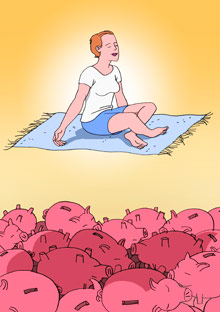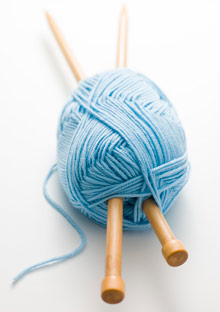
Illustration: Jorge Columbo
While the market plunges, free-floating anxiety is rising. How to cope with all the excess worry? Nancy Palmer reports on a few soothing ideas.
Money anxiety disorder: That's what you might call the latest American epidemic (the acronym, conveniently, would be MAD). According to a survey in October by the American Psychological Association, 80 percent of us find the recent financial crisis a significant cause of stress—up from 66 percent last April—and women are bearing the brunt of the worry, reporting greater concern over job stability and health problems affecting their families, for example, than men are. "Money is a safety net, as in, 'I may not be able to count on people, but I can count on my cash,'" says the APA's public education coordinator for Pennsylvania, David Palmiter, PhD. "Now the thinking's gone to: 'There's nothing between me and the abyss.'" You can find plenty of advice from financial experts on how to cope. But what about the pervasive sense of panic, which can take a serious toll on health, putting you at higher risk for a host of ailments from high blood pressure to heart disease. Science has shown that exercise and meditation are two of the most effective ways to reduce stress—but you probably already know that, and likely feel too pressured to try either. So we asked a few experts for other strategies you might not have considered.

© 2008 Jupiterimages Corporation
For years people have turned to hypnosis for help quitting smoking and losing weight, but the technique is also becoming popular among business types desperate to overcome financial stress, according to a November report in The Wall Street Journal. Generally, in hypnosis, a therapist uses verbal cues to put clients into a deeply relaxed state, where they become absorbed in their inner thoughts, then offers suggestions to shift an attitude so they can better tackle a problem. In this case, the suggestions might be "Money is energy that comes and goes" or "Your net worth doesn't equal your personal worth," to deflect the paralysis and insecurity that financial panic can cause. Ideally, clients learn the process on their own.
"Hypnosis is very similar to meditation," explains Dwight Damon, president of the National Guild of Hypnotists, who recommends trying a professional session before using the method on yourself. "While it won't make you richer, it will help you handle, and feel better about, the money you do have."
"Hypnosis is very similar to meditation," explains Dwight Damon, president of the National Guild of Hypnotists, who recommends trying a professional session before using the method on yourself. "While it won't make you richer, it will help you handle, and feel better about, the money you do have."

Photo: © 2009 Jupiterimages Corporation
To lower financial stress, set a budget for each day and reward yourself, suggests Alvin Hall, a financial commentator on BBC TV and radio and author of You and Your Money: Mastering the Emotions Behind the Numbers. "Ask yourself: 'What is the one thing I can do that will give me the longest-lasting uplift for the least amount of money?'" During the economic downturn of 1987, Hall's treat was blackberry pie. "I'd think about it all day, and if I came in under my budget," he says, "I'd go order a slice. When I couldn't afford that, I'd visit the museum and look at Van Gogh paintings."

Photo: © 2009 Jupiterimages Corporation
Or exchange massages with your partner. According to Robert Sapolsky, PhD, professor of neurology and neurological sciences at Stanford University, who has studied wild baboons for 30 years, primates groom each other to reduce stress—and the effect seems to be more powerful for the one who is doing the primping.

Photo: © 2009 Jupiterimages Corporation
According to research at the Harvard-affiliated Benson-Henry Institute for Mind Body Medicine, the repetitive motion and focus of needlework can elicit what's known as the relaxation response—a calming meditation-like state that slows heart rate and causes blood pressure to drop. In addition, a study published in the Journal of the American Geriatrics Society suggests that knitting is associated with a lower risk of dementia for those 65 and older.

Photo: © 2009 Jupiterimages Corporation
During the Great Depression, "stress took the form of personal shame," according to historian David M. Kennedy, Pulitzer Prize–winning author of Freedom from Fear: The American People in Depression and War, 1929–1945. His own father, he says, had "what we would call a nervous breakdown." Kennedy observes that a much healthier and more resilient attitude for our times is: "Taking some responsibility but seeing this downturn more as a systemic failure and not a personal one."
Don't worry, be savvy! 25 solid-gold ways to save (without giving up your latte)
Don't worry, be savvy! 25 solid-gold ways to save (without giving up your latte)
As a reminder, always consult your doctor for medical advice and treatment before starting any program.




